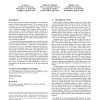Free Online Productivity Tools
i2Speak
i2Symbol
i2OCR
iTex2Img
iWeb2Print
iWeb2Shot
i2Type
iPdf2Split
iPdf2Merge
i2Bopomofo
i2Arabic
i2Style
i2Image
i2PDF
iLatex2Rtf
Sci2ools
CCS
2011
ACM
2011
ACM
SURF: detecting and measuring search poisoning
Search engine optimization (SEO) techniques are often abused to promote websites among search results. This is a practice known as blackhat SEO. In this paper we tackle a newly emerging and especially aggressive class of blackhat SEO, namely search poisoning. Unlike other blackhat SEO techniques, which typically attempt to promote a website’s ranking only under a limited set of search keywords relevant to the website’s content, search poisoning techniques disregard any term relevance constraint and are employed to poison popular search keywords with the sole purpose of diverting large numbers of users to short-lived traffic-hungry websites for malicious purposes. To accurately detect search poisoning cases, we designed a novel detection system called SURF. SURF runs as a browser component to extract a number of robust (i.e., difficult to evade) detection features from search-then-visit browsing sessions, and is able to accurately classify malicious search user redirections resul...
CCS 2011 | Information Storage And Retrieval | Search Engine Optimization | Security Privacy | Seo Techniques |
| Added | 13 Dec 2011 |
| Updated | 13 Dec 2011 |
| Type | Journal |
| Year | 2011 |
| Where | CCS |
| Authors | Long Lu, Roberto Perdisci, Wenke Lee |
Comments (0)

